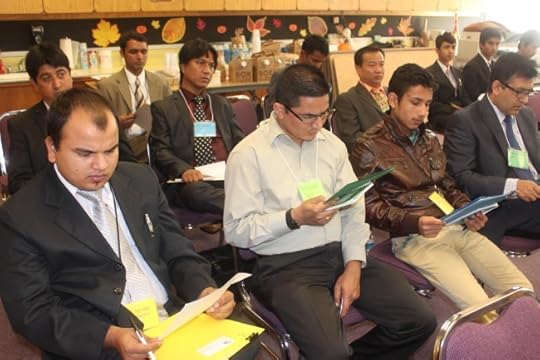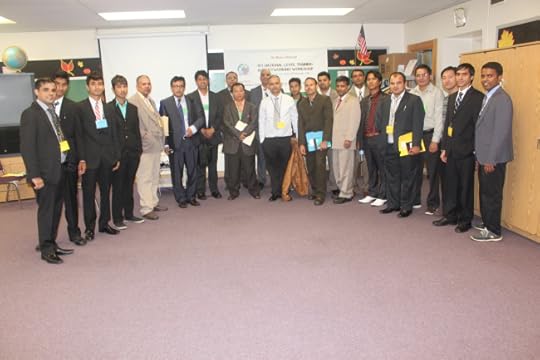Lisa Napoli's Blog, page 3
December 30, 2013
My personal year-in-review (is less about me than others)
 As so many of us are contemplating what we want out of the new year that’s dawning, I found myself making a list of what I managed to get accomplished over the last year, which happened to be my 50th.
As so many of us are contemplating what we want out of the new year that’s dawning, I found myself making a list of what I managed to get accomplished over the last year, which happened to be my 50th.
While I didn’t do anything that by conventional standards was notable or headline-worthy (no bestsellers, no blockbuster deals, no gorgeous bouncing babies, house purchases, etc.) I was happy to see, in review, that it’s been productive–and more importantly, productive in a way that helps other people, my own personal mandate.
(Note: Only one of the things on this list involves making money. Also note: This list is not in any particular order.)

Women of the DWC bake for their coffeeshop
1. The cooking group I wrangle at the Downtown Women’s Center (for women in need) helped them win a $25k grant from the Halo Foundation. We can’t solve homelessness by making dinner for people in need, but we can feel a part of our community and provide a healthy meal for those who don’t have access to what most of us take for granted.
2. I researched and spearheaded a movement that led to a rent abatement for over 100 of our neighbors due the loss of our beloved swimming pool and other services here on Bunker Hill.
3. Working with another neighbor, we managed to clean up a deteriorating area of our community and involve/alert local officials, as well as draw media attention to the problem.
4. I’ve been working with Bhutanese refugees to help them with their all-volunteer media service that chronicles their resettlement around the world.
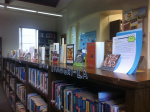
Academy of our Lady of Peace examines Shangri-La
5. Of all the interesting places where I am asked to talk about the themes in Radio Shangri-La, an all-girls Catholic school in San Diego and a gathering of hundreds of youth at the Kroc Peace Center earlier in the year.
7. I interviewed Michaela Haas, the author of a compelling book about female Buddhist spiritual leaders, at a meditation center.

Vince at the gleaming Marlins stadium
8. Along with my brother and boyfriend, we wrangled my parents and elderly aunt to a baseball game (a dream of theirs.) Later in the summer, we corralled my boyfriend’s elderly mother for a fun outing that involved ice cream and “freaking unbelievable hamburgers.”
9. I’ve read a lot, lot, lot, partially for my research on my Joan Kroc book but partially just because, which makes me happy especially when I hear people complain they don’t have time to read.
10. My paying job, at KCRW, allows me to meet and talk with incredibly interesting people doing incredibly interesting things, usually having to do with art, usually mostly underfunded and otherwise unpublicized. Being able to share those conversations with the radio-listening and Web-viewing public is an honor. It’s an incredibly rewarding (to me) use of my media background.


October 12, 2013
The power of media: All-volunteer Bhutan News Service, run virtually, keeps refugees up on the diaspora
The all-volunteer Bhutan News Service is hosting a training session in Pittsburgh this weekend. Exiles from Bhutan make up the largest population of refugee newcomers to that city, so it’s a logical location.
About 50-thousand refugees, resettled from camps along the Nepali border in a dispute that dates back over 20 years, are scattered around the world, but the majority have been brought to the US in the last several years.
BNS is an online-only concern, with contributors sending in reports from around the world. (Its current editor, Buddha Mani Dhakal, resides in Kentucky.) The idea is to keep the refugees connected as they’ve been resettled, both with news of what’s happening inside Bhutan, as democracy takes root there–and with information about what the refugees are facing as they build new lives. Suicide, for one thing, is high among the relocated refugees.
Of course, the information exiled Bhutanese are most interested in is whether officials in Bhutan will engage in discussions to resettle them in-country, or to even acknowledge their existence. (Most Bhutanese dispute that the people in question were ever actually citizens.) That kind of news is rare.
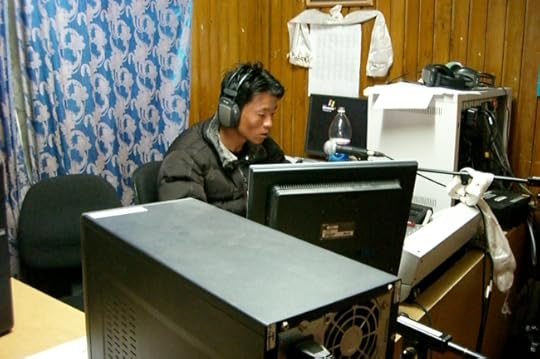
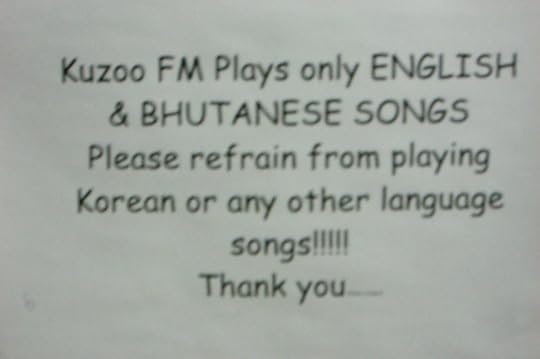 Since I first went to Bhutan to volunteer with the first non-governmental radio station Kuzoo FM in January 2007, I’ve slowly unearthed the previously little-told story of the southern Bhutanese. Just as I felt privileged to volunteer with young journalists at the dawn of democratic rule in Bhutan, (as the media landscape was just beginning and a newly drafted Constitution guaranteed freedom of the press,) I feel lucky to be in touch with the refugee population, too.
Since I first went to Bhutan to volunteer with the first non-governmental radio station Kuzoo FM in January 2007, I’ve slowly unearthed the previously little-told story of the southern Bhutanese. Just as I felt privileged to volunteer with young journalists at the dawn of democratic rule in Bhutan, (as the media landscape was just beginning and a newly drafted Constitution guaranteed freedom of the press,) I feel lucky to be in touch with the refugee population, too.
Today, in a session we held via Skype, I had the curious responsibility of explaining to the group (from my home in Los Angeles) what media are like today in modern Bhutan. See, many of the younger contributors to BNS have never set foot in the country–they were born in refugee camps. None of the constituency has been there since long before 1999, when TV was first introduced into Bhutan. I felt an awesome weight on my shoulders, for having witnessed and experienced what I have as a third party.
After 30 years in journalism, I’m often cynical about the state of the profession. But knowing this group of people, who take the incredible responsibility of informing the world about their situation and using media as a glue to hold them together, makes me feel the incredible power of communication. I believe that power will yield some sort of resolution to this long-standing dispute, hopefully sooner rather than later–as Bhutan changes, as the world changes, as we all change.


October 1, 2013
The power of books and reading
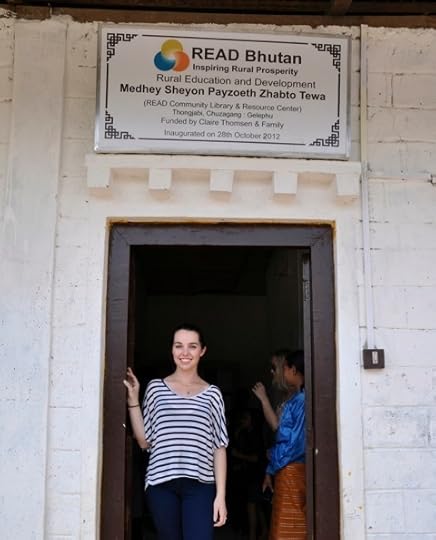 I love libraries. I use them all the time. A young friend last week saw the library book in my hand and kind of sniffed at it, as if it were weird.
I love libraries. I use them all the time. A young friend last week saw the library book in my hand and kind of sniffed at it, as if it were weird.
But he hasn’t been to a place where books are rare. He can buy books whenever he wants on his iPad. And even if you’re like him, I hope you’ll consider the power of libraries, too.
Like a supermarket, a community’s library tells you a lot about a place. One of the most amazing experiences I’ve had was visiting a READ Global library in Ura, Bhutan–the first library built outside the nation’s capital city, 11 hours from it, in fact. Kids in this beautiful farming village drank up the library from the moment the doors of the creaky converted farmhouse opened. One boy told me proudly that he had a small stack of books of his own. They all couldn’t wait to show me their favorite books.
Somehow my infectiousness for the place trickled over to a little girl named Claire, who subsequently helped raise enough money to build another library there.
Here’s the story about her wonderful feat, from adventurer and explorer Richard Bangs on the Huffington Post.
You don’t need to raise enough money to build an entire library. And the library you support doesn’t have to be half a world away. But I share this in the hopes you’ll be inspired, like Claire was, to share the power of books and reading.


September 4, 2013
Connecting, touch, radiation, and the digital age: OMmmmmm
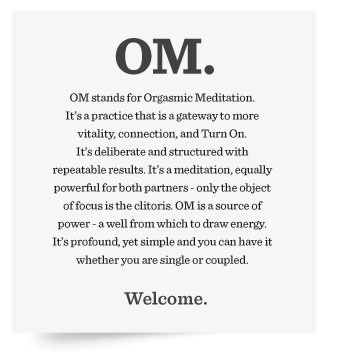 Recently two very different websites have landed in my in-box which I’d like to share. And, I’d love to hear your take on each of them.
Recently two very different websites have landed in my in-box which I’d like to share. And, I’d love to hear your take on each of them.
One is a website/book about the impact of technology on our wellness–not just on our attention, or the dangers of texting and driving (d’oh) but about the physical impact of the rays. A wireless wake-up call, the authors call it.
If you’ve ever looked at a pregnant woman and thought, “Umm, maybe that cell phone isn’t a great idea,” or wondered about what that iPad on your lap might be doing to your insides, or, to your kid, read this website from Canada called Safer Tech Solutions.
The other item involves a different kind of turning on, and raises different concerns (at least to me)–in this case about intimacy in the digital age.
It’s a modern version of the concept Erica Jong famously put forth in her soon to be re-released classic, Fear of Flying. It’s called OM. No, it’s not a chant you recite during yoga. It’s a female empowerment exercise, involving a fully-clothed man, a “nest,” and touch. Read more about this commodification of something wonderful here.
As a former business reporter, hats off to the folks who have created what’s in essence a multi-level marketing scheme around the basic human need for physical touch. As a woman, I’m concerned that experimentation and female sexuality has been reduced to this.


August 3, 2013
Not about happiness
 What’s this, you might ask? The newly elected prime minister in Bhutan, the articulate, social-media-sophisticate and Harvard-educated Tshering Tobgay, has already declared that he doesn’t see it as his job to promote the Gross National Happiness thing to the rest of the world.
What’s this, you might ask? The newly elected prime minister in Bhutan, the articulate, social-media-sophisticate and Harvard-educated Tshering Tobgay, has already declared that he doesn’t see it as his job to promote the Gross National Happiness thing to the rest of the world.
The recently exited last prime minister made a big show of the happiness discussion, appearing at the United Nations and other places to discuss the benefits of Gross National Happiness. (Which, by the way, was simply a term bandied in an offhanded remark by the then-Kingsome 40-odd years ago in response to a reporter’s question about his planned economic growth strategy.) He was roundly criticized by educated Bhutanese for doing so, while economic and social problems swirled and grew around him.
This seeming shift isn’t really a surprise. This new prime minister has long decried the shiny, happy thing (see the paperback edition of my book, actually, where we meet during his service as opposition leader) and realizes there are other deeper issues in Bhutan to be addressed.
Many intellectuals in and around Bhutan hate the “happiness” thing. (Less educated people there aren’t really aware of it; they’re too busy tending the land and surviving.) One reason some snipe at my 2011 book, Radio Shangri-La, is because they assume from the title that it’s all about celebrating Bhutan and tra-la-la happiness. (When in fact if they bothered to read it, they’d learn that it’s all about how media and globalization–and the promise of making piles of money–are making Bhutan unhappy. Which is why some other people dislike the book!)
Of course the irony is that media headlines (like book titles) reduce complex issues to slogans and soundbites–which is another theme I tackle.)
Tshering Tobgay is to Bhutan like Barack Obama was to the US back in 2008, a powerful and thoughtful steward of promise and change. It’s going to be exciting, these next five years, to see how he tackles issues like rising unemployment, alcoholism and corruption, among other problems that Bhutan sadly faces along with most of the rest of the world.
And maybe, just maybe, he’ll even address the refugee issue….


July 21, 2013
Travel to Bhutan with us: March, 2014
Champaca Journeys’ John Leupold is an experienced tour operator who has been co-leading trips to Bhutan with his ‘man-on-the-ground’ Dorji Khandup for years now.
I’m honored that they’ve asked me to partner with them on a “Radio Shangri-La tour of Bhutan.”
Want to join us? Click on the photo for more information, or write to me and I’ll send you the itinerary.


July 11, 2013
Take Two: Bhutan’s second round of democratic ruling
Last time the Bhutanese went to the polls (2007-2008) was the first time. 80% of the electorate reportedly voted, and they hadn’t even demanded democracy! The King just presented it to them, and asked them to please go to the polls. The party platforms were barely distinguishable from each other, and the citizenry overwhelmingly elected the party that wasn’t related to the King.
The leaders of that party, including the man who became Prime Minister, were not newbies to the scene in Bhutan, though. And now, five years in, it sounds like democracy there morphed very quickly into the garbage we have here in the US.
The irreverent site Bhutanomics, which is banned in Bhutan, sums it up in this editorial:
“….people have realised that this is not democracy. The benefits of democracy were not felt by the people. They did not feel involved in governance, or in the endless changes in government policies. They saw cliques and power centres forming around supposedly elected leaders. People close to the centre of power began to enjoy unimaginable and unjustifiable economic and professional rewards…. People are not looking for an individual leader. They are looking for change.”
Bhutanomics, at least, feels that change will come in the opposition party, who has been lead these last years by Tshering Tobgay. What happens next–we’ll find out soon.
If you want to follow the proceedings, which are starting in just a bit, the BBS has a nice page. So does Kuensel. (Click on some of the candidates just to get a sense of the tone of the race. I’m waiting for the day an American politician describes her/himself as “selfless.”)


July 1, 2013
Bhutan News Service
 To those disturbed by the Bhutanese situation as raised by this weekend’s piece in the New York Times, I offer up one way to keep informed, and also, to help. Please check out the Bhutan News Service.
To those disturbed by the Bhutanese situation as raised by this weekend’s piece in the New York Times, I offer up one way to keep informed, and also, to help. Please check out the Bhutan News Service.
It’s run predominantly by 5 volunteers around the world in service of the community that’s been displaced. They run on a shoestring (less than 5k a year), and need support.
Even if you can’t give financial assistance, they are seeking other help, such as filing for a nonprofit status so they can apply for journalism grants, training, server support, etcetera. Their goal, too, is to have a gathering this fall.
If you are at all interested in media-in-exile from anywhere, but from Bhutan in particular, and if you can help in any way, you can find a link here.


June 29, 2013
NY Times: “Bhutan is no Shangri-La”
A strong piece today in the NY Times op-ed section today about Bhutan’s refugee situation will bring widespread attention to an issue I write about in Radio Shangri-la that’s been ongoing for over 20 years.
I’ve tried hard to get mainstream media to write about or talk about the refugees, particularly as they’ve resettled in the US, and particularly as debates have swirled in this country over immigration*, but to no avail.
To be sure, it’s a complex issue and my hope has long been that as the refugees integrate into US culture (as they have by the tens of thousands in the last few years) and their stories get heard that Bhutan will at the least open up a dialogue.
*The issue stems back to a time when there were more porous borders around Bhutan and people of Nepali origin were brought in to help built modern Bhutan. As their numbers grew, fears grew that Bhutan’s cultural heritage (not to mention control of Bhutan by “pure” Bhutanese) would dissolve. Please refer to the final chapter of the paperback edition of Radio Shangri-La, Jamie Zeppa’s Beyond the Sky and the Earth and Hutt’s Unbecoming Citizens for more thoughtful distillations of the situation.


June 28, 2013
The LiveTalksLA / Neil Gaiman playlist
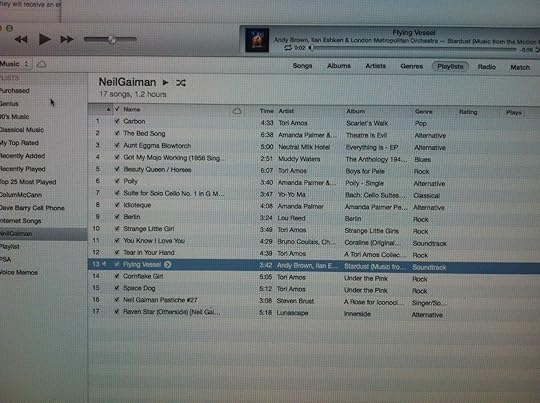 So, I like making music mixes for my boyfriend’s Live Talks LA pre-show. I get to probe deeper into the lives of the famous people he hosts. (Often people with whom I’m not at all familiar, since I don’t dwell much in the world of famous people, preferring instead the regular Joe.)
So, I like making music mixes for my boyfriend’s Live Talks LA pre-show. I get to probe deeper into the lives of the famous people he hosts. (Often people with whom I’m not at all familiar, since I don’t dwell much in the world of famous people, preferring instead the regular Joe.)
Researching what might work for blockbuster writer Neil Gaiman’s show last night was particularly fun. Hard-core fans will understand the deeper meanings of most of these choices (and those really hard-core people can research the choices they don’t understand.) It’s fun to mix tempos and such; how often will you hear Amanda Palmer’s ukulele alongside Yo-Yo Ma and Lou Reed?
I was happy to hear Mr. Gaiman noticed during soundcheck that we were playing his pal Tori Amos. Maybe he got my aural puns and brilliant research into his musical tastes, too.  On the flip side, I was sad that I didn’t put more music on this list, given that we all sat around for the signing for 5 long hours.
On the flip side, I was sad that I didn’t put more music on this list, given that we all sat around for the signing for 5 long hours.
At one point, he cried out for us to change the music. Makes sense. The only other stuff we had on the Live Talks iPod was gorgeous vocal music by the Benedictines of Mary nuns. After a few go-rounds of that ethereal stuff, it proved to be too soporific, and someone wrangled a higher-energy iPod with some Bruce on it to boost the room. I’m too wasted from yesterday’s proceedings to remember what else there was on that, but I did promise to share the initial list:
Carbon/Tori Amos
The Bed Song/Amanda Palmer
Aunt Eggma Blowtorch
Got my Mojo Working/Muddy Waters
Beauty Queen/Tori Amos
Polly/Amanda Palmer
Suite for Cello No 1 in G/Yo-Yo Ma
Idioteque/Amanda Palmer
Berlin/Lou Reed
Strange Little Girl/Tori Amos
You know I love you/Bruno Coulsis (soundtrack of Coraline)
Tear in your Hand/Tori Amos
Flying Vessel/London Metro Orchestra (soundtrack of Stardust)
Cornlake Girl/Tori Amos
Space Dog/Tori Amos
Neil Gaiman Pastiche #27/Steven Brust
Raven Star (Otherside)/Lunascape



